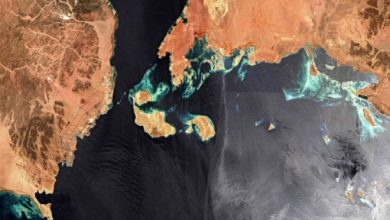Decoding Iran’s Attack on Israel: Beyond Theatrics to Strategic Implications

Watan-The well-known Palestinian activist and researcher Fadi Quraan, director of campaigns at the Avaaz Foundation in Palestine, presented a different analysis of the recent Iranian attack on Israel, which received wide attention following the controversy sparked by what many considered a “theatrical” attack. Criticisms, mockery, and accusations were directed at the Iranian regime as a result.
The first-of-its-kind attack launched by Iran on Israel on Saturday is seen as of utmost importance by the Iranian Revolutionary Guard to maintain its credibility among its allies in the region and its supporters domestically. Its aim is to demonstrate Iran’s will and the capabilities of its missiles and drones.
Iranians celebrated this strike in the streets; however, many Iranians critical of the regime suggest it does not necessarily reflect the views of the entire Iranian people.
Was Iran‘s attack on Israel just a “theatrical performance”? Amidst supporters, opponents, and cynics of this attack, Fadi Quraan provided his analysis, published on his official account on the “X” platform, suggesting that those who assume this attack was merely a theatrical performance lack context on how armies evaluate strategy versus tactics.
He explained that the display aspect might be important, but gathering intelligence about the “enemy” is far more crucial, especially if both sides believe they are in a protracted war of attrition.
He recalled a training course on military strategies he attended at Stanford University, led by an experienced individual with decades of experience, including service at the highest levels in the military and government.
“One of the lessons I always remember is when we were asked: ‘Let’s assume the United States decided to attack Iraq with a new stealth aircraft they’ve never used before and managed to evade all radars. The attack was successful in achieving its objectives. But was it a successful strategy?'”
Many students raised their hands, saying, “Yes, it was a successful strategy because it achieved its goal.” However, the professor said, “Perhaps it wasn’t.”
On Iran’s strike:
At Stanford, I attended a masterclass on military strategy led by a person with decades of experience, including serving at the highest levels in the military and government.
One lesson he thought that I always remember was this:
He asked us:
“Say the US…
— Fadi Quran (@fadiquran) April 14, 2024
Why?
“Because your opponent now knows your capabilities, and it’s only a matter of time before they find ways to overcome them. If this attack could be carried out with conventional weapons, it’s better to keep your distinctive weapons until you need them. Using them might represent a setback even if the attack succeeds.”
The prominent Palestinian activist concluded his analysis of this attack, which garnered significant attention on the X platform, as follows:
“My analysis is that the scale of the Iranian attack, the variety of targeted sites, and the weapons used forced Israel to reveal most of the missile defense technologies it and the United States possess throughout the region.
It’s a costly strategy for Israel
The Iranians didn’t use any weapons that Israel didn’t already know they possessed; they just used a lot of them. But it’s likely that Iranians now have a nearly complete map of what appears to be Israel’s missile defense system, as well as the locations of American bases and facilities in Jordan and the Gulf. They also know how long it takes for Israel to prepare, and how Israeli society responds…etc.
This is a costly strategy for Israel, at a time when Arab regimes are under pressure from their people, especially the Jordanian regime, for not doing anything to protect Palestinians in Gaza and then going out of their way to protect Israel.
It is crucial that Iran can now conduct reverse engineering on all the intelligence gathered from this attack to carry out a more devastating attack. While the United States and Israel will have to redesign a new defensive model different from their current one that has been breached. Therefore, their success in stopping this planned attack remains exceedingly costly.
Also, with the threat of a regional war that neither the United States nor Arab regimes want, their pressure on Israel to retreat is likely to increase, making a ceasefire more feasible.
Assuming that this attack is just a theatrical performance lacks context on how armies evaluate strategy versus tactics. The display aspect may be important, but gathering intelligence about the “enemy” is much more crucial, especially if both sides believe they are in a protracted war of attrition.
Netanyahu and the Israeli government prefer a quick, hot, urgent war where they can drag America into conflict. Iranians prefer a longer war of attrition that deprives Israel of its deterrence capabilities and makes its alliance with Arab regimes and the United States a costly burden that cannot be sustained for long.
In the end, if you’re someone who hates war, and if you want peace, the only way to achieve that is to support the Palestinian struggle for freedom, justice, and dignity. There will be no comprehensive and sustainable peace as long as Palestinians live under a repressive apartheid regime.”






